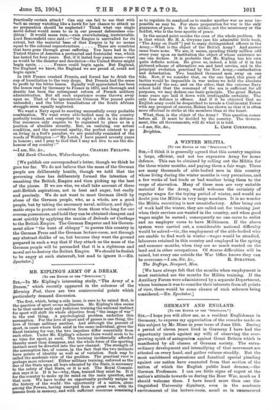The first, which, being a side issue, is sure to
be raised first, is the question of sport versus militarism. Mr. Kipling's idea seems to be that under early and judicious training the national instinct for sport will shift its whole objective from "the image of war" to the real thing. A psychological problem underlies this assumption. For the love of sport and of games is one thing, the love of things military another. And although the pursuit of sport, in cases where both exist in the same individual, gives the finest training for war, the two impulses differ essentially from each other. Under Mr. Kipling's scheme there would seem to be zio time for sport, as such. The training incidentally afforded thereby must then disappear, and the whole force of the sporting instinct must be diverted into the new channeL The strength of the assumption lies, of course, in ,the fact that the two instincts have points of identity as well as of variation. Such may be called the academic view of the problem The practical view is perhaps more relevant: Either military training, enforced as the due of the State upon all boys educated by the State, is necessary to the safety of that State, or it is not. The Royal Commis- sion says itIf it be—why, then, trained they must be. It is for the country- to make up its mind on the main question, and that soon. We have to-day an opportunity probably unique in the history of the world : the opportunity of a nation, alone among the Powers, having emerged from a- great war, with its lessons fresh in memory, and with sufficient resources remaining- emaining In the second point resides the crux of the whole problem. It is that which Mr. U. A. Gwynne (see his admirable little book, "The Army on Itself") put to many distinguished officers in the Army,—What is the object of the British Army?, And answer came there none. We are, it seems, spending thirty million odd every year upon an institution the object of whose existence no one can declare. It is probable that Mr. Kipling has his own quite definite notion. He gives us, indeed, a hint of it in his pictured scheme of alternative sea and land service, and in the principal evolution practised by the New Army,—embarkation and debarkation. Two hundred thousand men away on one tide. Now, if we consider that, on the one hand, this piece of tactics would be impossible in war unless we held the absolute command of the sea ;• and on the other, that the extreme Navy school hold that the command of the sea is sufficient for all purposes, we may deduce one basic principle. The great Mahan some years ago laid it down with irrefragable certainty. The only true defence is offence. And if it be objected that no English army could be despatched to invade a Continental Power with any prospect of success, Mahan has shown us that it is often more effectual to strike at the members than at the heart.
What, then, is the object of the Army? This question comes before all. It must be decided by the country. The Govern- ment, like all Governments, will do what it is told.
—I am, Sir, &c., L. COPE CORNPORD.
Brighton.


























































 Previous page
Previous page